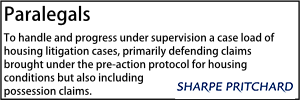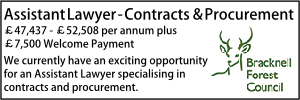
Careers Features
- Details
"Is a short interview a bad interview?"
 Raj Sidhu says:
Raj Sidhu says:
"Interviews for locum posts tend to be on average 30 minutes in duration. This is significantly shorter than what a permanent interview would be, but this is certainly the norm for locum posts. For example, a candidate just went in for interview for a childcare locum role in a London Borough through us today - his interview lasted just 20 minutes and he has subsequently been offered the role!"
Read Raj Sidhu's profile
 Gemma Beattie says:
Gemma Beattie says:
"Not necessarily, in fact even at the very senior end of the market we have seen successful interviews last as little as 20 minutes.
Interviews are however, an opportunity for you to promote yourself and ensuring you answer questions thoroughly is essential (without over talking).
In order to ensure you maximise your chances at interview, there are a few important things to remember.
1. Preparation. Ensure you have as much information as possible on your potential employer, the team you will be joining and the job specification. Your recruitment consultant can help you with this and prepare you for the likely format of the interview.
2. Anticipate questions from the interviewer. Read your CV again. You must be familiar with it and be able to answer honestly and concisely any questions that may be asked.
3. Arrive 10 minutes before. Arriving too earlier or late can set things off on a bad note,
4. Questions for the Interviewer. Interviews are a two way process. Prepare any questions that you may have. Don’t be afraid of writing them down and taking them into the interview. Such preparation will reassure the interviewers that you have thought about the meeting beforehand and that your career matters to you. It should also ensure that you have the information needed when making any future decisions.
Once you have undertaken the steps above you will be well prepared for any interview, giving yourself the best possible opportunity to respond confidently and articulately to most of the questions. This will ensure your full range of skills are demonstrated to the interviewer. Make use of your consultant – they should be able to use their experience to guide you."
Read Gemma Beattie's profile

- Details
"I have always been sceptical about locuming, and not having the security of a permanent role - however I hear that it is lucrative - Is this true?"
 Amy Bullock says:
Amy Bullock says:
"Our clients are increasingly leaning more towards recruiting on a temporary or locum basis down to both economic and political uncertainty. Due to this within some disciplines temporary roles are much more lucrative than the equivalent permanent opportunities currently available. They also provide a much faster income stream as the turnaround times of the recruitment process are much quicker to meet the immediate needs of the client.
Over the course of the last twelve months a number of key areas have emerged, demanding experienced local authority specialist lawyers including childcare, adult care and employment. These new trends have led to expert lawyers within these areas becoming the highest paid legal locum professionals in the market, earning up to £50 per hour. These lucrative hourly rates mean that there has been an increase in lawyers that are keen to work in these areas.
Additionally, temporary work is often a preferable career choice for a number of jobseekers as it offers a range of benefits, and it is no longer seen as inferior when compared to permanent positions.
As well as providing the opportunity to control your work life balance, with a high degree of flexibility, it can open up a diverse range of opportunities with varying challenges and within different environments – enhancing your CV as new experience is gained.
Locum work is a channel for networking, as well as a reputation building exercise and can therefore often lead to further guaranteed work. It can regularly lead to an extended position, either on a contract or permanent basis – with approximately 75 per cent of contractors securing further work. Additionally accepting a locum role provides you with the opportunity to experience working somewhere before making the decision to accept a permanent role.
To ensure that you are able to secure continued locum work you need to remember that the expectations of an employer are no different than if you were employed on a permanent basis. You need to work hard, complete your tasks, remain focused and learn as much as you can from the role to help widen your skill base for the future."
Read Amy Bullock's profile
 Emma Khanna says:
Emma Khanna says:
"Locum roles tend to be ongoing positions, so can actually turn out to be fairly long-term (e.g. often a year plus). When you work out what the equivalent annual salary is to an hourly rate that you would be paid as a locum, it is almost certainly always higher than what you would be paid as a permanent employee in that post in local government."

- Details
“How do I answer competency-based questions correctly?”
 Katie Allen says:
Katie Allen says:
"Prospective employers use competency-based questioning to uncover how the person in from of them has reacted and performed in various situations. This reveals personality traits and gives the interviewer a deeper understanding of how the candidate may act if employed in their organisation.
For example your interviewer may ask you “Please describe a time when you have failed to meet a deadline”
The interviewer will be looking to establish how you organise and manage your time in high pressured or difficult situations and the reasoning behind why you were unsuccessful in reaching your deadline.
Candidates should always detail specific answers, which are detailed, thought out and clear. Justifying why they failed to meet the deadline without making excuses. For example a good answer would explain the missed deadline whilst also providing examples of personal competencies and skills that are positive.
For example a good candidate would answer “In a previous role I failed to complete a financial report on time for my manager. I wanted the report to be detailed and comprehensive but unfortunately our accounts team hadn’t processed the figures that I needed. As the report was a final year-end document that would be reviewed at the board meeting I wanted the document to be comprehensive, correct and detailed. To ensure that my manager was not left without the required information I contacted them and discussed a new timeframe that suited everyone involved. I feel that although I did not meet my deadline that the situation was handled in the most effective way possible and the report was much more informative than it would have been had I not negotiated an extended timeframe”
TOP TIPS
1. Always give a wide variety of answers that are related to your business, personal or educational experiences.
2. Never fabricate your answers; the person interviewing you will be able to tell.
3. Make a list of your key competencies and think of examples for each
4. Always prepare and think about good examples to common competency based questions, it is a good idea to rehearse these with somebody at home or your consultant
5. Always present yourself in an enthusiastic and flexible manner

- Details
“My department is merging with the team at a neighbouring council. What effect will this have on my career?"
 Paul Gilbert says:
Paul Gilbert says:
“The impact is likely to be significant, but whether it is a positive or negative impact depends all sorts of factors. Combining teams provides an opportunity to make some savings from shared best practice, from more thoughtful deployment of resources and from the way external law firms are used. In this period of change there is some opportunity to be involved in significant integration projects, to learn from working at close quarters with others and to have more influence across a wider range of issues. For the most part, moving through a period of change and being tested intellectually and emotionally is an experience that many of us will have in our careers (sometimes more than once) and from which we can learn a great deal.
“Clearly however another cost saving opportunity is to reduce headcount; if that is part of the process then it is possible that roles will be at risk and some people will lose out. I will try to avoid platitudes and clichés at this point however it is the case that most lawyers working in in-house roles will move on every 3-5 years. Sometimes this will be their choice, but inevitably (for some) it will be as a result of restructuring and role redundancy. The best advice at this point is to ensure that one’s personal conduct is professionally exemplary, that a positive outlook is maintained and lawyers start to approach their personal transition with significant planning around researching the market, networking and if possible some personal development.
“One thing is clear at the moment and it is that the public sector is leading much of the innovation in legal services; that being the case the sector is potentially one of the more diverse, strategic and dynamic sectors to work in. A lawyer that can take some advantage of this period, even when there might be some personal disruption is likely to be a more valuable employee.”
Read Paul Gilbert's profile Kelly Wadkins says:
Kelly Wadkins says:
“Shared Legal Services is still a relatively new concept and it has had varying effects on staffing levels across the country. On the one hand, it has led to redundancies, often at senior management or middle management level; on the other hand, we have seen some shared service departments establish a law firm model / structure, in which their revenue / budget comes directly from billable hours. Such a model has allowed larger departments to bid for neighbouring authorities work, thus increasing workflow and staffing levels.”

- Details
There are good reasons to believe that the skills of local government and other public sector lawyers will be needed more than ever to help their employers through the next few years of upheaval. But there will almost certainly be some redundancies. If you are affected, it is vital to remain as positive as you can and see the impending career change as a challenge to be overcome, says LawCare.
The threat of redundancies has hovered over many parts of the legal profession recently. Major City and national law firms have implemented cutbacks as they realign those parts of their businesses that have suffered a downturn. Criminal and family legal aid practices have been hit by tendering changes. Although there have been court cases over the legality or otherwise of the selection methodology used, the reality is that the government needs to make public spending savings and that equates to the legal aid budget being diminished – it is only the extent of that reduction that remains to be clarified.
Now there is significant and understandable concern over the likely outcome of the Treasury’s Comprehensive Spending Review next week. Inevitably, the review will lead to a significant and challenging financial climate that will require not only tighter than ever restraints on the public purse, but also the restructuring of the organisations delivering many public services.
There need to be savings which, in many cases, could lead to the loss of jobs for lawyers working in central government departments, local authorities and private practices reliant on public sector work. The country faces a period of change, austerity and challenge and as a result, many highly competent and efficient lawyers are going to have to face the prospect of a career change.
The future will be a challenge, but the secret to limiting its detrimental impact is to see it as exactly that – a challenge to be overcome and an opportunity to improve lifestyle and enjoyment of life.
So, it is vitally important when facing redundancy, reduced hours, loss of colleagues, changing structure or changing workload, to remain resilient and, above all, positive. If facing the pressure in a negative mode, you will already be fighting an uphill battle. Retaining belief in oneself and embracing change will help the mind and body adapt. Sometimes a change – albeit an enforced one – is surprisingly rewarding.
Consider the following tips for dealing with this difficult period:
- Don’t bottle up or hide your emotions. Share your feelings and concerns with a loved one, a colleague or phone LawCare for support and a listening ear
- Analyse what you are and are not good at. Make a SWOT analysis. Then follow up those areas the analysis shows to be your strengths
- Now is the time to try new things, especially if it’s something you have always wanted to do – perhaps try a different area of the law; apply for judicial appointment; open an animal refuge
- Inevitably, you will panic and take a scatter-gun approach to job applications, so some you apply for might be appropriate for you, but others may not. If you feel that you have to settle for something you don’t want, just to keep your income stream, then still keep looking whilst doing that job to the best of your ability
- Don’t be frightened – this is the time to move onwards and upwards
- If you are still unable to raise enthusiasm, go and see your GP. Get checked over and see if some small medical intervention is appropriate
- You may benefit from investing in an appointment with a Career Consultant
- Upgrade your CV and make it sparkle and stand out from the crowd. Get it checked over by an expert. Your local college, university or law school or a recruitment agency can help, they are experts in this field and do it on a daily basis
- If you still want to stay in the same area of the law, call in favours from friends, previous colleagues or opponents who know how good you are
- Consider taking a locum position
- Register with a good recruitment agency and look at areas of the law that are growing and perhaps consider retraining and/or relocating if necessary.
Above all, come and talk to LawCare – 0800 279 6888 – Monday to Friday 9am to 7:30pm, Weekends/Public Holidays 10am to 4pm, 365 days of the year. Alternatively visit our website www.lawcare.org.uk for lots of really helpful information.
Remember, at the end of the day, it is the job that is redundant, not you.
- Details
The past few years have been tough ones for local authority lawyers and the spending cuts are hardly likely to improve matters. However, there is plenty that local government lawyers can do to defend and enhance their situation, writes David Swallow.
When I was starting Articles I recall a grandee of the Law Society saying that a professional person (Solicitors no doubt in mind) was "someone who was paid so that he could work whereas a non-professional person worked so that he could get paid". At the time this struck me as an interesting little tangle of words which defied my experience of the world and placed a small fig leaf around the fact that the man in question was a senior partner in one of the magic circle firms. So I imagined that he was being paid quite a lot so that he could work.
However I did know that he was making a point about society and its need for institutions, values and buttresses for stability. This said, things lay dormant in my mind over the years but latterly the mantra has started to throw out a shoot or two.
My reflections on the past
It is a pretty bleak landscape that we face and we need to rethink and do so quite quickly. I am not just talking about the economy or the impending and truly drastic cuts in the public sector which have to be imposed in order to protect Banker's bonuses. The fact is that over the last 25 years or so there has been a truly devastating decline in the status, influence and even the existence in some places of the Local Government Legal Service.
When I started in local government, the legal service knew that it had not just a role in local government but that that role was pivotal. Since then every local authority reorganisation, whether national or local, has tended to lower it further and further down the status ladder. Also on a day-to-day basis when senior officers are considering change or projects, at what stage do they consult their in-house solicitors. Is it at the end of the process or somewhere near the beginning (or not at all).
And over the same period there has been another change. Again when I started my career, public and private sector solicitors barely spoke to each other. Now they are talking all the time. But in truth the private sector has raided the public sector and cherry picked its' requirements. The private sector is now the research and development department behind local government. It is also the essential ingredient for any team involved in projects or change within local government. The partnering ethic and numerous other factors have resulted in a public sector legal service which looks to the private sector as a matter of course for its training, for its research, for its vision and for its energy.
Potential failures
Part of this transformation is the failure of local government solicitors and, in particular, the huge membership to value their own professional existence or exert themselves in that direction. Of course it does not help that separate professional bodies exist in the form of ACSeS and SLG and it is to be hoped that this can change. What is needed is one body that can begin to pull the Local Government Legal Service out of the despond into which it fallen and it is to be fervently hoped that a bit of vision and realism will break out sooner rather than later. However that is a fairly obvious point and not really the main theme of this article.
With the exception of the topic of Governance, where there is a degree of parity at the top table, there is virtually no field of law where the private sector is not involved as an absolute necessity for anything remotely serious. It is emphatically not the theme of this article to bemoan the value or use of the private sector or the value of partnering and there are many situations in local government where the use of the private sector legal resource is essential.
But in the old days (may I ?), in my region of the country, there used to be an attendance rate at Local Government Group Branch meetings of as many as 75 solicitors and trainees from all levels, quarterly, on a Friday night and most stopped for a sit down dinner afterwards. Now, for many reasons, you can be lucky to get 10 ageing souls at lunchtime and the best you can hope for is middle of the range sandwich, to be eaten at pace, and listen to an external lawyer or barrister on a specialist subject spreading the word that they have a product and are available to sell it to you. The best therefore is what I would call "grab and go" training with precious little in the way of genuine social or professional intercourse amongst the Members.
Re-kindling self-confidence
The Local Government Legal Service need to re-find its self confidence in all the general areas of local government law if it is to have any chance of reversing the decline in its general reputation both inside and outside the local government circles. It needs to project itself and become again the real custodian of local government law and the application of that law to affect people's lives.
It also needs to re-find and re-believe in the true values of the practice of local government law in a non-profit making environment. The root distinction between the public and the private sector is that one is commercial and the other is not, and that distinction applies however much it is dressed up as eg strategic partnering. The difference is that the private sector must see everything as turning a profit. That is the fundamental of its existence. That is not wrong of itself and is of course a real driving power, amongst other things, for quality. The public sector may need to and even may want to live with that but recognise it is must.
The public sector lawyer's values derive from strong attachments to strong local democratic organisations; ethical dealing; the ethical process, and the pursuit, through that, of the Common Good. They are freed of the personal commercial imperative. They are genuinely people who are paid so that they can work (although they are not paid enough). They use their professional qualifications so that they can improve the collective local common good in a fair, just and equitable manner. They are there truly to help individuals and families achieve their own bit of the common good, in order to progress individual quality of life and the experience of individual application and use of rights and responsibilities and the acquisition of property, sufficient to sustain lives within the community. It is a pivotal role in the conduct of the state. And tangentally it is a recognition that commerce should be the servant of society and not its master.
Reasserting the public sector role
The role of the public sector lawyer is pivotal to the realisation of that train of thought and belief which is one reason why the public sector local government lawyer is so important, particularly at the application end of the supply chain. However, part of that possibility of re-asserting the importance and role of the public sector lawyer is a re-evaluation, a realisation, a re-appreciation and a re-establishment of the value of professional association.
If local government solicitors are to regain respect from others and their own self esteem, they will need to re-find themselves and regain their strength and resolve and one way forward is through professional association. Not that is, association where the first question is what can I get out of this but, rather, what can I put in. It is the giving which is so important. Forget "grab and go" and BOGOFF. It really is a time for "and so my fellow Americans ask not what your country can do for you - ask what you can do for your country" (John Kennedy).
It is a commitment to being active; to making a contribution; to becoming a specialist on a branch of law; to having the courage to assert knowledge and skill, combined, to become known and respected. It is the understanding that a singular feature of the reason for existence public sector lawyers is the application of value driven advice and legal practice. It is nothing short of reclaiming your collective name and birth right and without a name you can have no pride or self worth or even in some cases existence. I am talking of identity loss and identity theft.
A potential health warning
I am conscious as I write this that there should be a health warning on the article - a best before date. Things are moving so dramatically that the only way to keep up is to Blog. A stake in the ground is washed away almost as soon as it is banged in.
What will be the longer term of effect of the changes proposed on the services so fundamental to our country.
It is a time of huge change and no-one is better placed than the local government practitioner to speak about that and there never was a time when speaking out was more urgent or that there was such a good chance of being listened to. That speaking out could and should be done through association.
There are personal action plans to be made by all who care about the Local Government Legal Service – if you are a chief legal Officer, and whatever your views on ACSeS and SLG you have a clear interest and responsibility in this matter, you can decide to properly support professional association for those in your office – there are numerous ways in which you can do it but the support needs to be sustained, tangible, active and high profile, and at the least you can encourage attendance and at best you could also encourage office holding.
Time to believe
If you are an SLG member, take an active part in association and make a contribution – be a branch chair, be a secretary, join the local executive as a representative, be a SIG convener, go to Branch meetings and speak, join in and/or start email discussion, go to SIG meetings and prepare contributions; seek outlets for articles and raise your own external profile; make yourself a leader on public sector law; support and use the website. Above all start to believe – maybe then people will start to take notice. Maybe then you will ultimately be paid better!
David Swallow is a consultant.
This article first appeared in ACSeS' Firing Up the Passion for Leadership: Developing Future Chief Executives publication. To get hold of a copy (for a nominal £10 to cover production costs) contact the Association of Council Secretaries and Solicitors at Afon Building, Worthing Road, Horsham, West Sussex, RH12 1TL; telephone: 01403 788249; e-mail:
Page 20 of 24
Assistant Director - Legal & Governance
Director of Legal and Governance (Monitoring Officer)
Senior Lawyer - Advocate
Head of Governance & University Solicitor
Events

 Back to Basics: Construction Insurance and Insolvency - Devonshires
Back to Basics: Construction Insurance and Insolvency - Devonshires
16-07-2025 2:00 pm
Online (live)
 Institutional landlord series: Service and Notices – from Possessions to Injunctions and Requests for Access - 5 Pump Court
Institutional landlord series: Service and Notices – from Possessions to Injunctions and Requests for Access - 5 Pump Court
16-07-2025 4:00 pm
Online (live)
 HMPL Building Blocks: Tackling Non-occupation and Sub-letting - Devonshires
HMPL Building Blocks: Tackling Non-occupation and Sub-letting - Devonshires
17-07-2025
Online (live)
 To establishing whether Material Changes of Use have occurred - Ivy Legal Training
To establishing whether Material Changes of Use have occurred - Ivy Legal Training
18-07-2025 9:30 am
Online (live)
 Business and Property Masterclass #5: Interim Relief – Acting urgently and getting it right - Cornerstone Barristers
Business and Property Masterclass #5: Interim Relief – Acting urgently and getting it right - Cornerstone Barristers
10-09-2025 11:00 am
Online (live)
 Business and Property Masterclass #6: Rights of Light and Restrictive Covenants - Cornerstone Barristers
Business and Property Masterclass #6: Rights of Light and Restrictive Covenants - Cornerstone Barristers
23-09-2025
Online (live)
 HMPL Building Blocks: Service Charges & Ground Rent – Tackling Leasehold and Shared Ownership Arrears - Devonshires
HMPL Building Blocks: Service Charges & Ground Rent – Tackling Leasehold and Shared Ownership Arrears - Devonshires
14-10-2025
Online (live)
 Institutional landlord series: Possession – High Court Enforcement - 5 Pump Court
Institutional landlord series: Possession – High Court Enforcement - 5 Pump Court
22-10-2025 4:00 pm
Online (live)
 Institutional landlord series: Costs Recovery and Legally Aided Parties - 5 Pump Court
Institutional landlord series: Costs Recovery and Legally Aided Parties - 5 Pump Court
05-11-2025 4:00 pm
Online (live)
 HMPL Building Blocks: Law and Procedure Following Death of a Tenant - Devonshires
HMPL Building Blocks: Law and Procedure Following Death of a Tenant - Devonshires
09-12-2025
Online (live)
 HMPL Building Blocks: Legal Tools to Combat Anti-Social Behaviour - Devonshires
HMPL Building Blocks: Legal Tools to Combat Anti-Social Behaviour - Devonshires
17-02-2026
Online (live)
 HMPL Building Blocks: Tenancy Management – Assignment, Mutual Exchange and Succession - Devonshires
HMPL Building Blocks: Tenancy Management – Assignment, Mutual Exchange and Succession - Devonshires
12-03-2026
Online (live)

















































 A-Z Family Law: Take Two! - 42 Bedford Row
A-Z Family Law: Take Two! - 42 Bedford Row  Executive Programme in Public Procurement Law and Policy - University of Nottingham
Executive Programme in Public Procurement Law and Policy - University of Nottingham  Property Law Roadshow 2025 - Bristol - St John's Chambers
Property Law Roadshow 2025 - Bristol - St John's Chambers  CUBAS Comprehensive Training & Licencing (Manchester), September 2025
CUBAS Comprehensive Training & Licencing (Manchester), September 2025  AI in the Public Sector Conference - Westminster Insight
AI in the Public Sector Conference - Westminster Insight  Activism in the Workplace - 42BR Barristers Employment Law Annual Lecture
Activism in the Workplace - 42BR Barristers Employment Law Annual Lecture  DoLS Authoriser Training - LPS Law
DoLS Authoriser Training - LPS Law  Property Law Roadshow 2025 - Cardiff - St John's Chambers
Property Law Roadshow 2025 - Cardiff - St John's Chambers  Annual Fraud Conference 2025 - Oxford Investigation Service
Annual Fraud Conference 2025 - Oxford Investigation Service